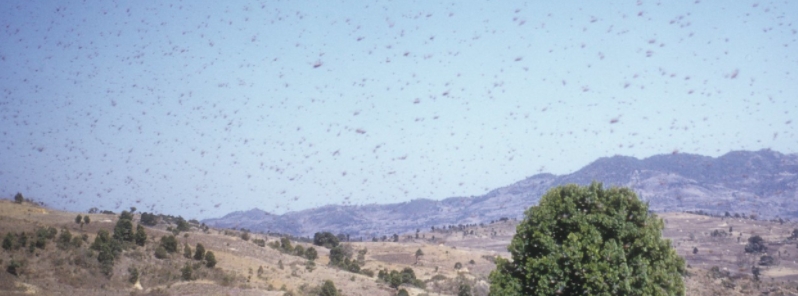Locust plague persists in Ethiopia, threatening crops and livelihood

Crops and livelihoods in Ethiopia are at high risk as locust plague persists in the country, with the highest number of swarms reported in the northern and central region. According to the UN Food and Agriculture Organization (FAO), immature swarms are currently affecting areas in Oromia and SNNP, including southern areas of the Rift Valley.
The ongoing locust crisis in Ethiopia is threatening the country's crops and livelihood, CARE Ethiopia reported, warning that high rains in March are likely to worsen the situation.
"Ethiopia is currently facing a triple threat crisis with locusts, flooding from last year, and COVID-19," said CARE Ethiopia country director, Esther Watts.
"These latest swarms are a real worry and added stress on an already struggling population suffering from high levels of hunger, malnutrition, and loss of livelihoods across many areas."
"Heavy rains and mild winters then contribute to the survival of the large swarms that decimate food security and sources of income," she noted.

In a statement, Watts said that the organization is "particularly worried about the impact the loss of crops and livelihoods will have on women and girls," as forced early marriage practices often increase during times of economic crisis.
The director added that CARE is working in the affected areas of Hararghe and northern Amhara, with livelihoods and resilience programs also covering locust response.
More than 2 700 families are being provided with financial support for livelihood recovery.
"For the near future, programming in Tigray will focus on restoring the disrupted agricultural input supply by supporting service providers, such as agro-dealers, poultry farmers, and animal feed producers, so that farmers are prepared for the coming planting season, as well as contributing to the humanitarian response."
Currently, the highest number of swarms have been reported in northern and central Ethiopia in a total number of 26 zones. According to FAO, the affected areas are East Harerghe, Arsi, Borena, and several sites in SNN, including South Omo, Konso, and southern areas of the Rift Valley where more swarms were reported.
Featured image credit: Flickr

Commenting rules and guidelines
We value the thoughts and opinions of our readers and welcome healthy discussions on our website. In order to maintain a respectful and positive community, we ask that all commenters follow these rules.